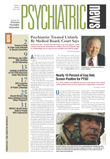The start of the Medicare Part D prescription drug benefit on January 1 has caused considerable stress for patients, pharmacists, and physicians. While we need to continue to advocate for immediate changes to make the program work as intended, we also need to get ready to respond to the real challenge of Medicare Part D—one that will long outlast the initial chaos of an unprepared startup. That challenge is the emergence of managed care in a new, national arena.
Medicare Part D is managed care, though the roll-out publicity avoided that term, and managed care can be managed. Providers and patients alike need to know the rules and be empowered by them. Now, while the prescription drug plans (PDPs) are still in their early months, and habits and expectations are being formed, it is essential that clinicians support each other and our patients to make Part D work to support patients' individual needs.
There are reports that plans are already demanding peer-reviewed literature to justify exception requests. We as psychiatrists need to respond coherently to these demands for external support for our decisions. In some instances it may be appropriate to cite published scientific evidence to support our requests. But the routine demand that public proofs be required for any exceptional request is intolerable, and the idea that statistical research is needed to justify an effective regimen is absurd.
The clinician's expert opinion regarding medical necessity for a prescription should be sufficient. No clinician should delay submitting a clinically urgent request to search for published proof of likely efficacy. If more proof of medical necessity is needed as an appeal progresses through its five stages (as outlined at<www.MentalHealthPartD.org>), adding another expert opinion may be more appropriate. Since most psychotropics are prescribed by nonpsychiatrists, this may be a service we can offer to our nonpsychiatric colleagues as we strive to improve our alliances in the house of medicine.
Physicians have the leadership responsibility to understand Medicare Part D, complex as it is. Dr. Jeffrey Kelman, a senior medical advisor at the Centers for Medicare and Medicaid Services, has repeatedly told us that if we persevere in appealing for what patients need, we are likely to succeed. It is also important that we help each other by supporting independent sources of information about Medicare Part D, like the Web site created by APA and some of its allies at<www.MentalHealthPartD.org>. Local initiatives are growing, such as the spreadsheets published on the Web sites of the New York Office of Mental Health at<www.omh.state.ny.us/omhweb/Medicare/formulary_guide.htm>, the Michigan Psychiatric Society at<www.mpsonline.org/html/selected_drug_tables.html>, and the Maine Association of Psychiatric Physicians at<www.mainepsych.org>, to help providers and patients compare plans' formulary management features.▪
